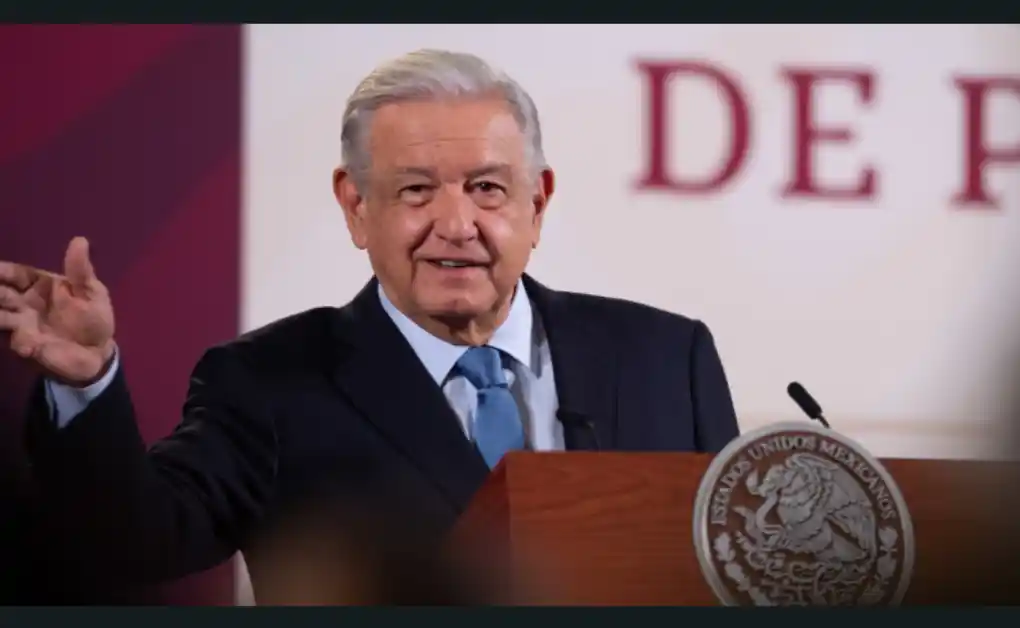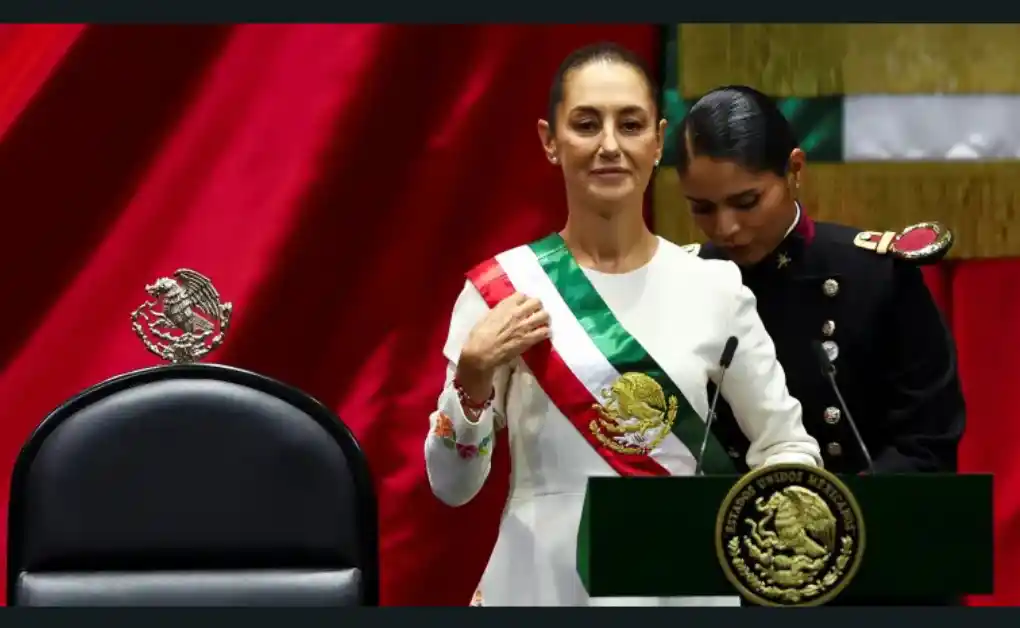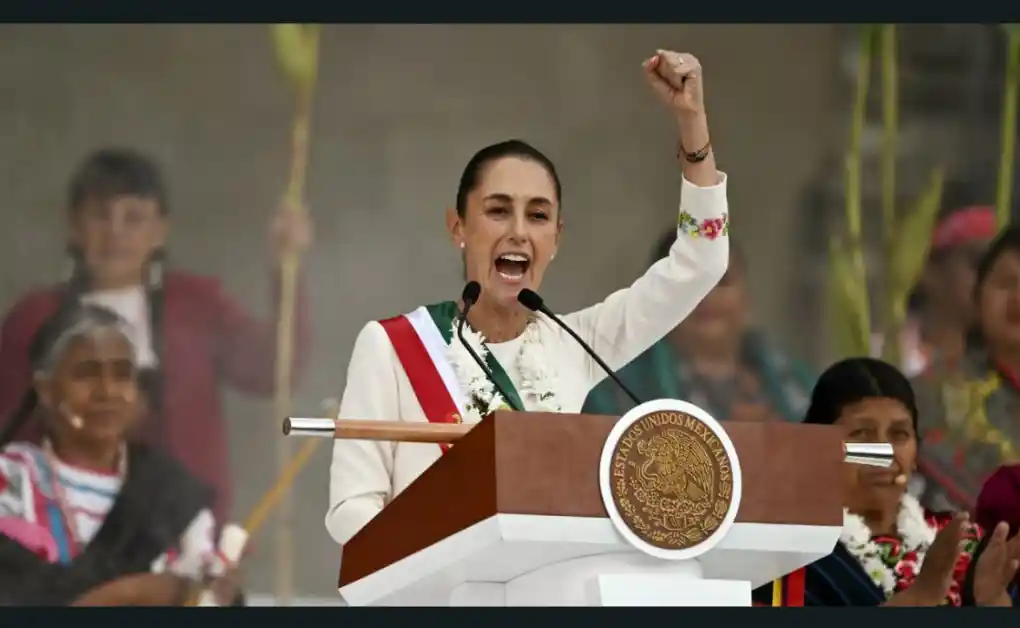Claudia Sheinbaum, an environmental scientist and former mayor of Mexico City, has made history by becoming Mexico’s first female president. Her victory in the June election marks a significant milestone for the country, as she steps into the role of Mexico’s 66th president at the age of 62. With a sweeping win, Sheinbaum faces both high expectations and substantial challenges, including cartel violence, economic concerns, and the need for judicial reform. As a close ally of outgoing President Andrés Manuel López Obrador, Sheinbaum is tasked with continuing his policies while navigating a path that will define her own leadership style. Here’s a closer look at Mexico’s first female president and what her presidency means for the country.

5 Key Things to Know About Mexico’s First Female President
1. Claudia Sheinbaum Becomes Mexico’s First Female President
Sheinbaum’s presidency represents a historic achievement as she is not only Mexico’s first female president but also the first with Jewish heritage. Her grandparents immigrated to Mexico from Lithuania and Bulgaria, adding a multicultural dimension to her background. Although Sheinbaum does not practice the Jewish faith, she embraces her ancestry and its influence on her life.
Her election is particularly meaningful in a country where gender-based violence and femicide remain pressing issues. Mexico has some of the highest rates of femicide worldwide, and during her time as mayor of Mexico City, Sheinbaum took steps to address the crisis by establishing an anti-femicide prosecutor’s office. Now, as the first female president of Mexico, she has promised to expand these efforts on a national scale, although some critics have pointed out the lack of specific gender-focused policies in her campaign.

2. From Scientist to Politician: Sheinbaum’s Background in Environmental Science
Before entering the political arena, Claudia Sheinbaum was an accomplished environmental scientist, holding a Ph.D. in energy engineering. Her academic career included a stint at the Lawrence Berkeley National Laboratory in California during the early 1990s. She was also a member of the United Nations Intergovernmental Panel on Climate Change team that shared the Nobel Peace Prize with Al Gore in 2007, demonstrating her longstanding commitment to environmental issues.
Her scientific expertise distinguishes her from other Mexican politicians, especially in the context of Mexico’s elections, where candidates with backgrounds in law or business are more common. Sheinbaum plans to bring her environmental knowledge to the presidency by focusing on renewable energy projects like solar and wind power, as well as increasing the use of electric vehicles. While she supports some of López Obrador’s energy policies, such as the controversial Dos Bocas oil refinery, she intends to push for a greener agenda.
3. The Protégé of López Obrador: Following in Her Mentor’s Footsteps
Sheinbaum’s rise to power is closely tied to outgoing President López Obrador, a figure who has left a profound mark on Mexican politics. She began her political career under his mentorship, serving as his environmental minister when he was mayor of Mexico City. Throughout her career, she has aligned with his vision of social welfare and economic equality, which helped secure her victory in Mexico’s election.
However, Sheinbaum has also shown a willingness to adopt a more independent approach. For example, during the COVID-19 pandemic, she took a science-driven stance, expanding testing and advocating for public health measures in Mexico City, in contrast to López Obrador’s more relaxed approach. As president, she has filled her cabinet with many of his trusted advisors, signalling continuity with his administration, but she will need to strike a balance between maintaining López Obrador’s popular social programs and establishing her own legacy.
4. A Strong Mandate Brings Both Power and Challenges
As Mexico’s first female president, Sheinbaum comes into office with a significant political mandate. Her coalition holds a supermajority in the lower house of Congress and nearly two-thirds control in the Senate. This political strength gives her the power to push through reforms and address major issues facing the country, such as organized crime and economic instability.
However, Sheinbaum also inherits significant challenges. López Obrador’s administration left a growing budget deficit due to extensive spending on social programs, the Dos Bocas oil refinery, and the Maya Train project. Additionally, a controversial constitutional amendment to replace judges with elected officials passed shortly before López Obrador’s departure, has raised concerns about the future of judicial independence. Addressing these issues will be a key test of her leadership.
5. Tackling Security and Migration: Key Issues for the New President
Security is a top priority for many Mexicans, as cartel violence and organized crime have escalated. Sheinbaum has pledged to address these problems by tackling the root causes of crime, a strategy that echoes López Obrador’s “hugs, not bullets” approach. At the same time, she plans to increase the presence of the National Guard and expand programs for youth education and employment as part of her broader crime prevention strategy.
On the issue of migration, Sheinbaum is expected to continue her predecessor’s policies, which involve close collaboration with the United States. Given the ongoing pressure from the U.S. to curb migrant flows, her administration will likely work on enforcing stricter migration controls while negotiating trade and other bilateral issues. Although migration is not a major concern for Mexican voters, the issue remains important for U.S.-Mexico relations.
The Historical Significance of Claudia Sheinbaum Becoming Mexico’s First Female President
Claudia Sheinbaum’s victory is a groundbreaking moment for Mexico. As the first woman to hold the country’s highest office, she shatters a glass ceiling that has long persisted in Mexican politics. Her election not only symbolizes progress for gender equality but also highlights the growing acceptance of diversity, as she becomes the first Jewish president in Mexico’s history.
Her administration’s commitment to tackling gender-based violence is particularly significant, considering the alarming rates of femicide in Mexico. While serving as mayor, Sheinbaum implemented programs to address this crisis, including creating an anti-femicide office. As the first female president of Mexico, she now aims to bring these initiatives to a national level, reinforcing her dedication to protecting women’s rights.
Balancing Environmental Policies with Energy Demands
Sheinbaum’s background as a climate scientist brings a fresh perspective to environmental policies in Mexico. She is committed to expanding renewable energy projects like solar and wind power, promoting sustainability in a country that still heavily relies on fossil fuels. However, she has faced criticism for supporting López Obrador’s investment in traditional energy sources, such as the Dos Bocas refinery, which has encountered budget overruns and environmental concerns.
Her approach will likely involve a delicate balance between promoting green energy and maintaining existing projects that support the nation’s economic growth. As a former environmental scientist, Sheinbaum has the expertise to potentially steer the country toward a more sustainable future, yet she must also address the economic realities tied to fossil fuel investments.
Navigating Judicial Reforms and Economic Stability
One of the most pressing challenges for Claudia Sheinbaum, the Mexican president, is the controversial judicial reform initiated by López Obrador. The amendment to replace Mexico’s judges with elected officials is intended to combat corruption but has sparked concerns about weakening the judicial system’s independence. This reform has already impacted the business climate, with uncertainty affecting the value of the Mexican peso.
Sheinbaum will need to reassure financial markets and business leaders while implementing judicial changes. Stabilising the economy, addressing the budget deficit, and creating investor-friendly policies will be crucial steps for her administration to avoid economic setbacks.
Addressing Gender-Based Violence and Women’s Rights
Sheinbaum’s presidency brings a renewed focus on gender issues. As Mexico’s first female president, she carries the expectation to make substantial progress in protecting women’s rights and addressing gender-based violence. Critics have pointed out her campaign’s lack of a detailed stance on issues like abortion rights, but her past initiatives in Mexico City suggest that she is prepared to tackle these challenges.

Expanding on her efforts to combat femicide as mayor, Sheinbaum aims to implement nationwide programs to protect women, improve law enforcement training, and establish better support systems for victims of violence.
The Impact of a Female Leader on Mexican Society
Having a woman as Mexico’s first female president could inspire more women to participate in politics and assume leadership roles across various sectors. Her election may help challenge traditional gender norms in Mexican society and encourage younger generations to pursue careers in public service. It is also a signal to the world that Mexico is evolving in terms of gender equality.
The Significance of Her Jewish Heritage
Claudia Sheinbaum’s Lithuanian and Bulgarian Jewish ancestry adds a unique aspect to her background, reflecting Mexico’s diverse cultural and historical influences. While she does not actively practice Judaism, her heritage is a reminder of the multicultural roots that have shaped her values and leadership approach. It also symbolises Mexico’s openness to diverse backgrounds in its highest office.
Conclusion: Claudia Sheinbaum Takes the Helm as Mexico’s First Female President
As Claudia Sheinbaum becomes the first female president of Mexico, she embarks on a journey fraught with significant challenges and expectations. Her presidency marks a turning point for women in Mexican politics, offering hope for progress in areas such as gender equality, environmental sustainability, and social justice. However, she must also navigate complex issues, including cartel violence, judicial reform, and economic stability, while asserting her own leadership style distinct from that of her mentor, López Obrador.
With a strong mandate and a commitment to addressing the country’s major concerns, Sheinbaum’s leadership will undoubtedly shape Mexico’s future. As the world watches, she has the opportunity to redefine what it means to be a female leader in Mexico, leaving a lasting legacy that could pave the way for future generations.
FAQs
Who is Claudia Sheinbaum?
Claudia Sheinbaum is an environmental scientist and former mayor of Mexico City who became Mexico’s first female president in 2023.
What is Sheinbaum’s relationship with López Obrador?
Sheinbaum is considered a protégé of outgoing President Andrés Manuel López Obrador, having worked closely with him for years. She has promised to continue his legacy while also pushing her own agenda.
What are Sheinbaum’s environmental policies?
As a climate scientist, Sheinbaum advocates for renewable energy, such as solar and wind, while supporting some of López Obrador’s fossil fuel projects like the Dos Bocas refinery.
How will Sheinbaum address cartel violence?
She plans to focus on addressing the root causes of crime, expand the National Guard, and create youth programs for education and employment.
What are the major challenges Sheinbaum faces as president?
She must tackle security issues, financial instability, and the implementation of a controversial judicial reform while reassuring businesses and establishing her political identity.